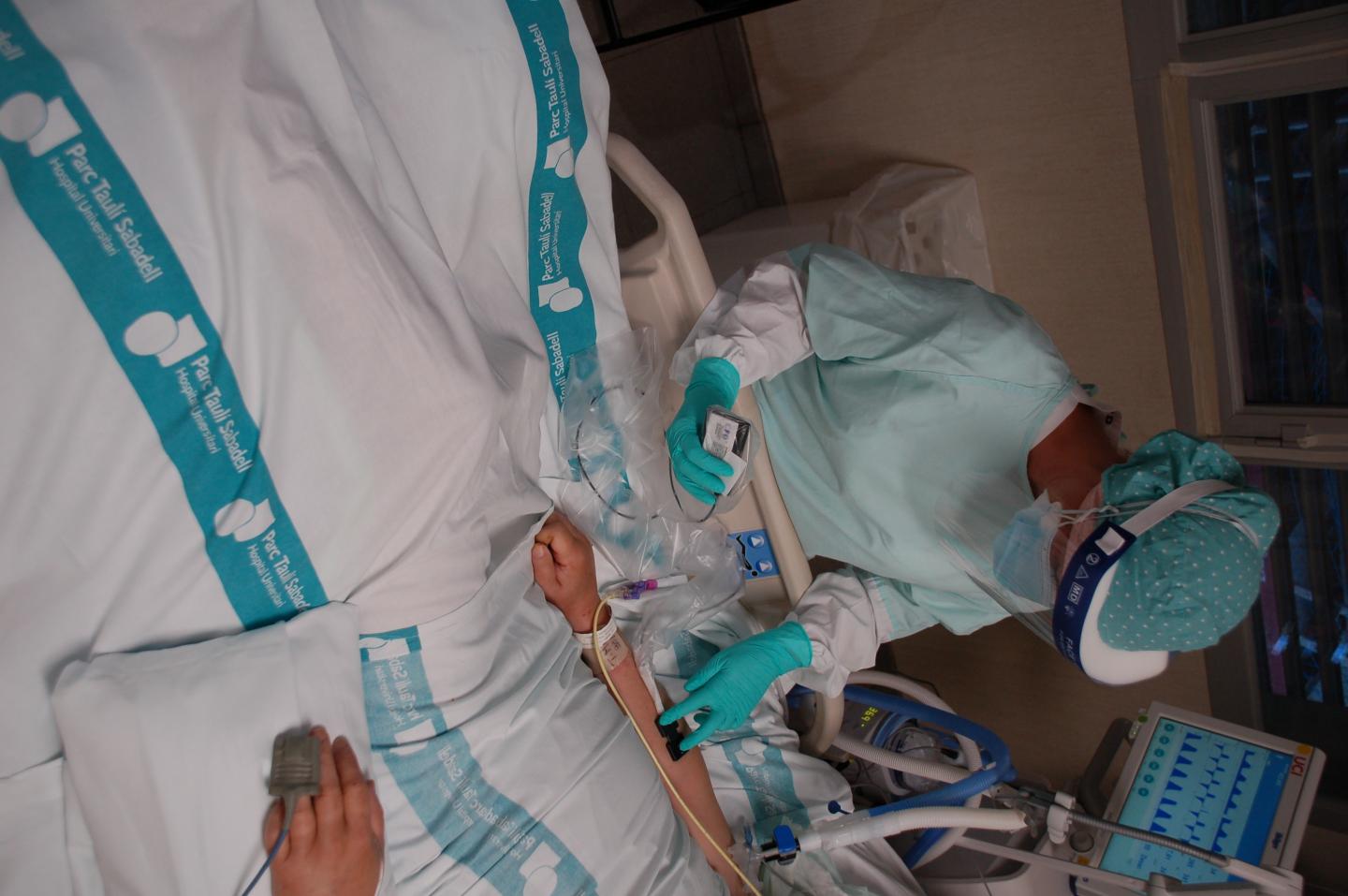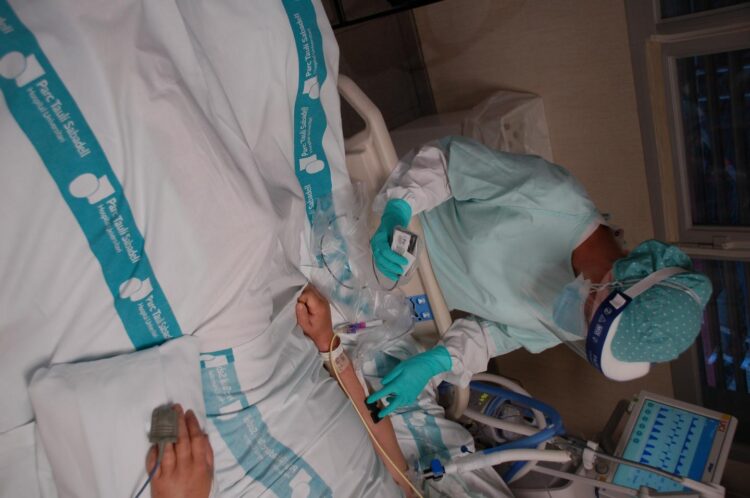
Credit: H. Parc Taulí
Few could have foreseen the considerable impact that SARS-CoV-2 has had so far and is still having worldwide. Numbers continue to escalate and the complexity of the COVID-19 symptoms have hindered all efforts to optimize its treatment.
The bulk of the research on the COVID-19 pandemic has focused on the detection of the disease, the development of vaccines and on understanding its basic mechanisms. This is going hand-in-hand with efforts to elucidate different factors that affect the outcome in patients. Among many different findings, it has been demonstrated that the microvascular health, in other words the health of the tiniest vessels, may play a key role in the evolution of the disease in COVID-19 patients.
The link between microvasculature & photonics
When lockdown occurred in Spain, a team of ICFO researchers and experts in the field of diffuse optics led by ICREA Prof. Turgut Durduran, got together to develop possible ideas based on photonics technologies that could help COVID-19 patients with adequate treatments. They rapidly worked online to take a commercial, near-infrared spectroscopy (NIRS) device and customize it with their algorithms to provide an evaluation of a patient’s microvascular health.
“Working on this project during lockdown was fascinating and extremely fast”, emphasizes Durduran. His team, involving postdoctoral fellows Marco Pagliazzi and Lorenzo Cortese, begun a collaboration with intensivists at Hospital Parc Taulí, led by Dr Jaume Mesquida, and together developed a set of hypotheses and corresponding protocols to test endothelial and microvascular dysfunction in COVID-19 patients. This collaboration was enabled by biophotonics technologies that utilize near-infrared light to measure blood oxygen saturation, volume and blood flow. The first device was sent to Hospital Parc Taulí in March and was tested on COVID-19 patients. Afterwards, the extent of the collaboration increased in such magnitude that an international consortium named HEMOCOVID-19 was formed with the assistance of Ariadna Martinez and Martina Giovannella from the ICFO knowledge and technology transfer team.
The HEMOCOVID-19 consortium uses the response of the microvasculature in the peripheral (in this case forearm) muscles to prolonged arterial cuff or blockage, i.e. induced by a device similar to a common blood pressure measurement unit, as a biomarker of endothelial and microvascular health. By using the aforementioned non-invasive, portable, wireless, battery-operated device, they are able to carry out measurements at different times during the intensive care stay. The goal is to provide enabling tools to help clinicians in the stratification of patients and to guide the development of therapies targeting the endothelial function as well as personalized rescue therapies that play a critical role in the management of severely ill patients.
As Dr. Jaume Mesquida, lead doctor at Hospital Parc Taulí, highlights, “This will be very useful not only for the stratification of the risk for COVID-19 patients [due to the complications related to Acute Respiratory Distress Syndrome] but also as a tool to evaluate the efficacy of potential new therapies for COVID-19 disease. To date, we do not have other parameters at the patient’s bedside to monitor endothelial function, and using this technology will probably be mandatory when evaluating therapies targeting the microcirculation, which seems to be very important in COVID-19. For sure, this will be also useful in other populations with underlying endothelial alterations or inflammatory diseases such as in septic shock patients”.
The story of HEMOCOVID-19 is one of the many. The team of researchers has the main goal of contributing to the well-being of the patients and global efforts taking place to minimize the damage caused by the disease. As Durduran mentions, “I would have never imagined that we could go from having an idea, to one week later developing materials and sending it to hospitals, and in two weeks obtaining ethical approvals and starting to take data. This is an indication that our technology has reached a level of maturity that has allowed us to take this big step forward. We are yet to see where this takes us.”
While other ongoing clinical studies were being put on hold to prioritize resources for the treatment of COVID-19 patients, ICFO, armed with many years of experience in research and development in diffuse optics for applications in neurology and oncology, was able to move forward through remote collaborations with hospitals in Barcelona and around the world to test a photonic tool with a lifesaving potential.
Next Steps
The preliminary results have encouraged the consortium and, thus, the next steps will involve the development of next-generation technologies aiming to improve the precision and expand the relevance. The consortium is growing and currently consists of ten partners in four countries; Spain, USA, Brazil and Mexico. HEMOCOVID-19 is coordinated by ICFO and in a truly open-science, collaborative manner is open to new members. The team has secured a number of new devices and built collaborations across the world, but to date and due to the global situation, has not met face-to-face with the partners of the consortium.
###
We acknowledge support from Fundació; Privada Cellex and Ajuntament de Barcelona as well as the collaboration and an instrument loan from Artinis (Netherlands).
MORE INFORMATION ABOUT THE PROJECT – http://www.
Video about HEMOCOVID-19 – https:/
ABOUT ICFO
ICFO was founded by the Government of Catalonia and the Universitat Politècnica de Catalunya (UPC), both of which are members of its board of trustees along with the Cellex and Mir-Puig Foundations, philanthropic entities that have played a critical role in the advancement of the institute. Located in the Mediterranean Technology Park in the metropolitan area of Barcelona, the institute currently hosts 400 people, organized in 25 research groups in 60 state-of-the-art research laboratories. Research lines encompass diverse areas in which photonics plays a decisive role, with an emphasis on basic and applied themes relevant to medicine and biology, advanced imaging techniques, information technologies, a range of environmental sensors, tunable and ultra-fast lasers, quantum science, photovoltaics and the properties and applications of nano-materials such as graphene, among others. In addition to three state awarded Severo Ochoa accreditations of excellence, ICFOnians have secured 15 ICREA Professorships and 37 European Research Council grants. ICFO is proactive in fostering entrepreneurial activities, spin-off creation, and creating collaborations and links between industry and ICFO researchers. To date, ICFO has helped create 8 start-up companies.
Media Contact
Alina Hirschmann
[email protected]





